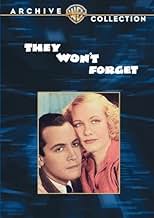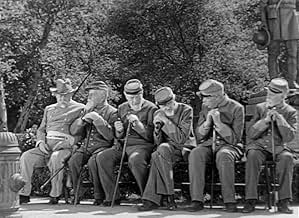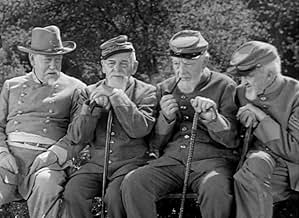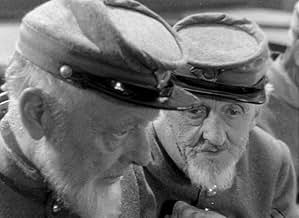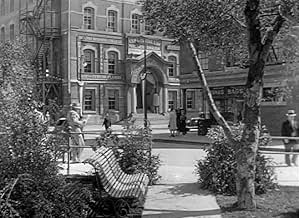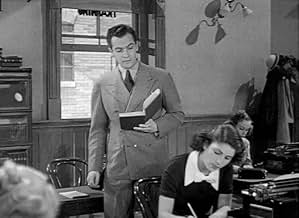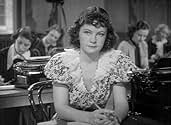Ajouter une intrigue dans votre langueA politically ambitious district attorney, unscrupulous tabloid journalists, and regional prejudice combine to charge a teacher with the murder of his student.A politically ambitious district attorney, unscrupulous tabloid journalists, and regional prejudice combine to charge a teacher with the murder of his student.A politically ambitious district attorney, unscrupulous tabloid journalists, and regional prejudice combine to charge a teacher with the murder of his student.
- Réalisation
- Scénario
- Casting principal
- Récompenses
- 3 victoires au total
- Mrs. Hale
- (as Elizabeth Risdon)
- Mrs. Clay
- (as Sybil Harris)
Avis à la une
**** (out of 4)
Terrific Warner drama about a school teacher (Edward Norris) from the North who's working in the South when one of his students his murdered. The local D.A. (Claude Rains), wanting to rise in the political game, charges the teacher with the murder not because of evidence but because the Southerners think he's guilty due to being from the North. I've been wanting to see this film for many years now after hearing so much about it and it certainly didn't let me down. I think the courtroom drama is probably my favorite genre and this here ranks with the very best out there. What really stands out are the performances, which are all excellent. Norris doesn't stand out in the crowd but he delivers a very somber performance. The real standout is Gloria Dickson as his wife. The final speech she gives is quite chilling and very memorable. Rains also gives a great performance, although I think he goes a bit over the top in a couple of the courtroom scenes. Lana Turner, in her screen debut, also comes off very memorable especially with her "giggle" as she walks down the street in that tight sweater. Mervyn LeRoy does a great job at building all the suspense and anger that surrounds the controversy of the case, which is based on a true story. After watching this film as well as Mississippi Burning this year it's rather amazing to know this stuff happened within the last one-hundred years.
It's Confederate Memorial Day, April 26, and the college lets out early, unexpectedly for instructor Edward Norris, a Northerner. But Turner returns for the vanity case she's left behind. Hours later, her body is discovered at the base of an elevator shaft. The town prosecutor (Claude Rains, slinging a Southern drawl) smells a political advantage that might propel him to the state senate, an advantage of no use if the perpetrator is only the illiterate black janitor who found her. Suspicion falls on Norris, and soon the judicial establishment, the press and the townspeople have turned against him. Outside help a detective and a defense attorney prove of no avail. Turner is convicted and sentenced to death; when the governor commutes his sentence, he's lynched (as was Leo Frank in the original case). It's fast, brutal and pretty unsentimental.
LeRoy was known for his slam-bang, take-no-prisoners style but here he dawdles at first. Under the credits is a medley of songs of the South, bolstered by quotations from Lincoln and Robert E. Lee to soften up those touchy audiences in Dixie so they won't know what hit them. When he gets up to speed, however, he doesn't slacken, cutting quick to advance the action his movie's an unstoppable steamroller, just like the judicial railroading of the story (the lynching itself, expressed by a mailbag clipped off its hook by a passing train, is especially and darkly adroit).
But there's a near-fatal flaw in the story. We're meant to harbor persuasive doubts as to Norris' guilt, but the possibility of a suspect other than he is never more than fleetingly entertained. The movie purports to document a miscarriage of justice, but it fails to build an ironclad case.
There's also an uncommon richness of detail. The script, for all its sprawl, remains tight and unrelenting, a genuine testament to writers Rossen and Kandel. Then too, producer Le Roy pulled out all the stops and the results show it. No one acts without apparent reason. Everyone has understandable motivations for doing what they do. That's why the upshot is so tragic. It's as though there's an on-rushing train nobody can stop because the momentum is carried by an infernal logic greater than the demands of justice. Despite appearances, it's not an anti-lynching film, though it is that. Rather, it's a down and dirty look at the cynical roots of injustice. From lowly pool hall to lofty city council, no one wants to convict an innocent man, but then no one much cares either. This movie stands as a fine example of why Warner Bros. was the studio of record during the stressed-out 1930's. Anyway, for guys who don't like the gloomy theme, there's always the chance to catch Lana Turner as she juggles two balloons while sashaying up the sidewalk in the film's most famous scene.
All in all-- a classic of 30's social realism, with Hollywood at its unapologetic best.
Le saviez-vous
- AnecdotesThe novel "Death in the Deep South" and this movie version were based on the notorious murder trial and subsequent lynching of Leo Frank. The film mentions the suspect's Northern background, which was a factor in his lynching, but does not mention that he was Jewish. The real-life victim, Mary Phagan, was only 13 years old, a far cry from Lana Turner's 16-year-old "sweater girl."
- GaffesDuring the entire trial the shadow of the window is showing in the same place; behind the witness chair/over the back door of the courtroom.
- Citations
Drugstore Clerk: What'll it all be be, ladies?
Imogene Mayfield: Dope and cherry, Fred.
Drugstore Clerk: [to Mary] How about you, half-pint?
Mary Clay: Make mine a chocolate malt and drop an egg in it as fresh as you are.
Drugstore Clerk: The hens don't lay 'em that good.
- ConnexionsFeatured in Hollywood and the Stars: The Angry Screen (1964)
- Bandes originalesKingdom Coming
(1862) (uncredited)
aka "The Year of Jubilo"
Music by Henry Clay Work
Played during the opening credits
Meilleurs choix
- How long is They Won't Forget?Alimenté par Alexa
Détails
- Date de sortie
- Pays d’origine
- Langue
- Aussi connu sous le nom de
- They Won't Forget
- Lieux de tournage
- Société de production
- Voir plus de crédits d'entreprise sur IMDbPro
- Durée1 heure 35 minutes
- Couleur
- Mixage
- Rapport de forme
- 1.37 : 1
Contribuer à cette page



